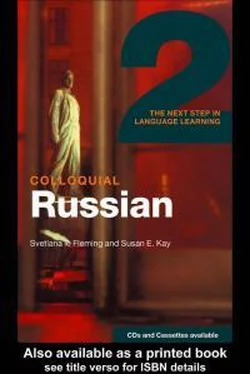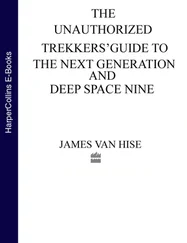8
Other pairs are differentiated by a suffix:
9
30
rewa´t; / rewi´t; to decide
1
pose]a´t; / poseti´t; to visit
2
vstava´t; / vstat;
3
dava´t; / dat;
4
sobira´t; / sobra´t; to collect
5
nadeva´t; / nade´t; to put on
6
or by the presence of the infix -yv- or -iv- in the imperfective: 7
podpiśyvat; / podpisa´t; ‘to sign’. For more about verbs of this 8
type see Unit 14.
9
Govori´t; has two perfectives: skaza´t; ‘to say, tell’ and pogov-40
ori´t; ‘to talk, speak’. Some other unusual perfective pairs include: 1
brat; / vzqt; ‘to take’; pokupa´t; / kupi´t; ‘to buy’; stanovi´t;sq /
421111
stat; ‘to become’.
36
|
Russia and the Russian language
Difference in usage between the imperfective and
perfective aspects
Imperfective aspect
1 Unfinished or continuous actions:
On ceĺyj den; smotreĺ televiźor.
He was watching / watched television all day.
Za´vtra q bu´du rabo´tat; v sadu´.
Tomorrow I will work in the garden.
2 Habitual or repeated actions:
My haśto igraĺi v teńnis \´tim le´tom.
We often played / used to play tennis that summer.
Oni´ bu´dut pla´vat; v moŕe ka´'dyj den;.
They will be swimming / will swim in the sea every day.
3 Emphasis on the process of the verb:
Q l[bl[
´ kata´t;sq na ly´'ax.
I love skiing.
4 After the verbs nahina´t; / naha´t; and stat; ‘to begin’; konha´t;
/ końhit; ‘to finish’; prodol'a´t; ‘to continue’ and some other verbs with similar meanings, the imperfective infinitive is always used:
Q toĺ;ko hto końhila rabo´tat; nad \´toj kni´goj.
I have only just finished working on this book.
For other verbs meaning ‘to stop’ see Unit 14.
Perfective aspect
1 Emphasis on completion or result. This may be a single action: On końhil rabo´tu.
He finished the work.
Vy dol'ny
´ prohita´t; \´tu kni´gu sego´dnq.
You must read (finish reading) that book today.
or a series of actions, each one completed before the next one starts:
Q vstańu, primu´ duw i odeńus;.
I will get up, take a shower and get dressed.
Rossiq i Russkij Qzyk
|
37
1111
2 Some perfectives with the prefix po- imply that the action is 2
performed for a short time only:
3
My posideĺi v saduí powli´ domo´j.
4
We sat in the garden for a while and went home.
5
6
For aspects in relation to verbs of motion see Unit 2.
7
8111
Subjunctive
9
In addition to the five tenses described above Russian also has a 10
subjunctive, formed by using the particle by with the past tense: Q
1
sdeĺala by ‘I would have done it’. Fuller information on the subjunc-2
tive is given in Unit 11.
3
4
Imperative
5
6
The third person imperative may be formed from either the imper-7
fective or perfective verb: deĺaj(te), sdeĺaj(te) ‘do!’. For fuller 8
information on this imperative see Unit 2. Dava´j / dava´jte, impera-9
tive of dava´t; , is used with the first person plural (my form) of the 20111
future perfective to form a first person imperative: Dava´jte sdeĺaem 1
‘Let’s do it’.
2
3
Exercise 13
4
5
Choose the appropriate verb form from the alternatives in brackets.
6
7
Raspa´d SSSR
8
9
Peŕvyj konfli´kt v Sove´tskom So[
źe (sluhi´tsq / sluhiĺsq) e]e¨ v
30
1986g v Alma Ate´. Zate´m v 1989g (nahinaĺsq / nahalsq´) konfli´kt 1
me´'du Armeńiej i Azerbajd'ańom po po´vodu Nagoŕnogo Karaba´xa.
2
A s 1989 konfli´kty staĺi (voznika´t; / vozni´knut;) prakti´heski 3
povs[
´ du: na Ukraińe i Kavkaźe, v Molda´vii i Pribaĺtike.
4
Sove´tskoe rukovo´dstvo snahaĺa ne (ponimaĺo / pońqlo) isto´kov 5
\´tix konfli´ktov. Odna´ko primeneńie siĺy v Ri´ge i Viĺ;n[se 6
v qnvare´
1991g uspe´xa ne (prinosiĺo / prineslo´). (Nahinaĺis; /
7
nahaliś;) peregovoŕy o no´vom so[
źnom dogovoŕe. Konfederati´vnyj
8
xara´kter predlo'eńij (vyzyvaĺ / vyźval) nedovoĺ;stvo so storony´
9
40
konserva´torov i (voznikaĺa / vozni´kla) ide´q perevoro´ta pro´tiv 1
refoŕm voob]e´. Pobe´da nad puthiśtami (privodiĺa / privela´) k 421111
nekontroliŕuemomu raspa´du SSSR. V dekabre´ 1991g prezideńty
38
|
Russia and the Russian language
Rossií, Ukraińy i Beloruśsii (podpiśyvali / podpisaĺi)
soglaweńie o likvidaćii SSSR i sozdańii Sodru´'estva
Nezaviśimyx Gosudaŕstv.
Vocabulary ♦
voznika´t; / vozni´knut;
to arise
dogovoŕ
treaty
Читать дальше












